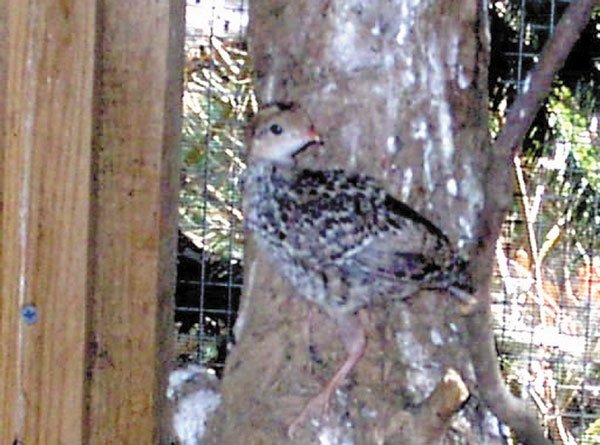Why did the quail cross the road? Perhaps they were rousted from
their hiding place in the bushes by a neighborhood dog or maybe
they were looking for seed in a nearby backyard. Whatever the
reason, it was no joking matter to a family of California quail in
Morgan Hill last month.
Why did the quail cross the road? Perhaps they were rousted from their hiding place in the bushes by a neighborhood dog or maybe they were looking for seed in a nearby backyard. Whatever the reason, it was no joking matter to a family of California quail in Morgan Hill last month.
Doris Chargin noticed a female quail frantically pacing back and forth next to a storm drain at the end of her driveway. On the other side of the road lay the dead body of a male quail, apparently hit by a passing vehicle.
Investigating the source of the female quail’s consternation, Doris found six tiny baby quail down the 5-foot deep drain, desperately calling for their mother.
Hoping that the mother would be able to get her babies back to safety by herself and not wanting to frighten the shy birds, Doris left them alone for the night. But the next day she found the babies still in the drain, cold and weak, and their mother gone.
With no time to waste, Doris’s husband rescued the little ones and brought them to W.E.R.C. where they were immediately placed under a heat lamp and given special food.
A feather duster was placed in a corner of the enclosure to simulate their mother; they ran under it just as they would run to her for safety.
Unlike many songbirds and raptors, which are born as helpless nestlings and require frequent feeding from their parents, quail basically hatch from the egg and “hit the road running.” They are precocial birds and are able to run around and find their own food just a few hours after hatching, though they remain with their parents for safety and bonding until they molt from down to feathers and are able to fly.
When the Chargins returned home, they found a seventh baby quail in the drain and back they drove to W.E.R.C. Sadly, two of the babies were in critical condition and did not survive, but the remaining five are healthy and growing up quickly. They have been moved to an outside enclosure to give them room to fly, run and scratch for seed. Because they are very social birds, they will be released within several weeks to a woodsy habitat abounding with other California quail.
W.E.R.C., the Wildlife Education and Rehabilitation Center, provides the community with rehabilitation services for orphaned, injured and sick native wildlife. Through their educational programs, W.E.R.C. encourages a peaceful coexistence between civilization and our native wildlife. To contact W.E.R.C. call (408) 779-9372 or visit www.werc-ca.org.












